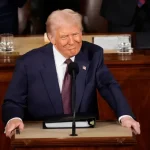

The House passed a GOP election integrity bill on Wednesday that will bar noncitizens from voting in federal elections, a win for House Republicans as they step up messaging ahead of the 2024 elections.
All Republicans voted to pass the Safeguard American Voter Eligibility Act, with all but five Democrats voting against the measure. The bill would amend the National Voter Registration Act of 1993 to require people to provide proof of citizenship before registering to vote.
The bill was introduced by Speaker Mike Johnson (R-LA) and Rep. Chip Roy (R-TX), the lead sponsor, in May after the speaker joined former President Donald Trump at Mar-a-Lago to voice concerns about election integrity heading into November.
“This will be one of the most important votes that members of this chamber will ever take in their entire careers. And it’s an issue we never thought we would have to actually address, but that moment has come to us now,” Johnson said on the House floor ahead of the vote. “Should Americans and Americans alone determine the outcome of American elections? Or should we allow foreigners and illegal aliens to decide who sits in the White House and in the people’s House and in the Senate?”
Democrats have blasted the bill as unnecessary GOP messaging on a matter that is already illegal. Democrats have also argued that evidence of instances of noncitizens voting is rare and, even if those ballots were detected, it would do little to sway a presidential election.
“Republicans’ continued election denialism is akin to collective hero syndrome, where individuals create harmful situations, like lighting a fire, only to seek praise for putting the fire out,” Rep. Joseph Morelle (D-NY), ranking member of the Administration Committee, said on the floor ahead of the vote.
CLICK HERE TO READ MORE FROM THE WASHINGTON EXAMINER
“The SAVE Act, and all the untruthful rhetoric around it, is part of the same project that election deniers began years ago,” Morelle added.
The measure will head to the Democratic-controlled Senate, where it will likely be voted down or delayed in being brought to the floor.






